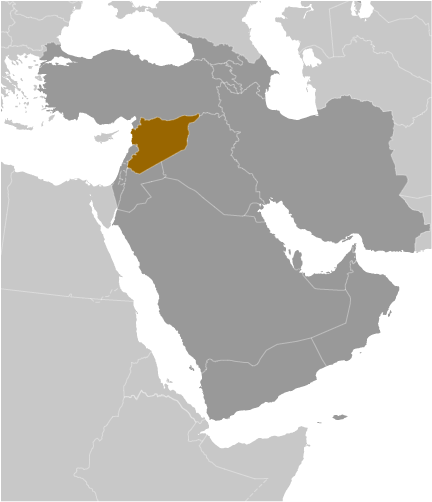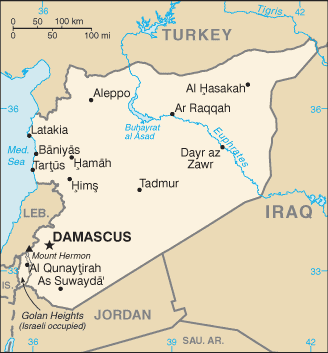Following World War I, France acquired a mandate over the northern portion of the former Ottoman Empire province of Syria. The French administered the area as Syria until granting it independence in 1946. The new country lacked political stability, however, and experienced a series of military coups during its first decades. Syria united with Egypt in February 1958 to form the United Arab Republic. In September 1961, the two entities separated, and the Syrian Arab Republic was reestablished. In November 1970, Hafiz al-ASAD, a member of the Socialist Ba'th Party and the minority Alawite sect, seized power in a bloodless coup and brought political stability to the country. In the 1967 Arab-Israeli War, Syria lost the Golan Heights to Israel. During the 1990s, Syria and Israel held occasional peace talks over its return. Following the death of President al-ASAD, his son, Bashar al-ASAD, was approved as president by popular referendum in July 2000. Syrian troops - stationed in Lebanon since 1976 in an ostensible peacekeeping role - were withdrawn in April 2005. During the July-August 2006 conflict between Israel and Hizballah, Syria placed its military forces on alert but did not intervene directly on behalf of its ally Hizballah. In May 2007 Bashar al-ASAD was elected to his second term as President.
Population
22,198,110 (July 2010 est.)
Country comparison to the world:51
Nationality
Noun:Syrian(s)
Adjective:Syrian
Ethnic groups
Arab 90.3%, Kurds, Armenians, and other 9.7%
Religions
Sunni Muslim 74%, other Muslim (includes Alawite, Druze) 16%, Christian (various denominations) 10%, Jewish (tiny communities in Damascus, Al Qamishli, and Aleppo)
Languages
Arabic (official); Kurdish, Armenian, Aramaic, Circassian widely understood; French, English somewhat understood
Country Name
Conventional long form:Syrian Arab Republic
Conventional short form:Syria
Local long form:Al Jumhuriyah al Arabiyah as Suriyah
Local short form:Suriyah
Former: United Arab Republic (with Egypt)
Government Type
republic under an authoritarian military-dominated regime
Capital
Name:Damascus
Geographic coordinates:33 30 N, 36 18 E
Time difference:UTC+2 (7 hours ahead of Washington, DC during Standard Time)
daylight saving time: +1hr, begins first Friday in April; ends last Friday in October
Administrative divisions
14 provinces (muhafazat, singular - muhafazah); Al Hasakah, Al Ladhiqiyah (Latakia), Al Qunaytirah, Ar Raqqah, As Suwayda', Dar'a, Dayr az Zawr, Dimashq, Halab, Hamah, Hims, Idlib, Rif Dimashq (Damascus), Tartus
Independence
17 April 1946 (from League of Nations mandate under French administration)
National Holiday
Independence Day, 17 April (1946)
Constitution
13 March 1973
Legal system
based on a combination of French and Ottoman civil law; Islamic law is used in the family court system; has not accepted compulsory ICJ jurisdiction
Suffrage
18 years of age; universal
Executive branch
Chief of state:President Bashar al-ASAD (since 17 July 2000); Vice President Farouk al-SHARA (since 11 February 2006) oversees foreign policy; Vice President Najah al-ATTAR (since 23 March 2006) oversees cultural policy
Head of government:Prime Minister Muhammad Naji al-UTRI (since 10 September 2003); Deputy Prime Minister for Economic Affairs Abdallah al-DARDARI (since 14 June 2005)
Cabinet:Council of Ministers appointed by the president
(For more information visit the World Leaders website)
Elections:president approved by popular referendum for a second seven-year term (no term limits); referendum last held on 27 May 2007 (next to be held in May 2014); the president appoints the vice presidents, prime minister, and deputy prime ministers
Election results:Bashar al-ASAD approved as president; percent of vote - Bashar al-ASAD 97.6%
Legislative branch
unicameral People's Council or Majlis al-Shaab (250 seats; members elected by popular vote to serve four-year terms)
Elections:last held on 22-23 April 2007 (next to be held in 2011)
Election results:percent of vote by party - NA; seats by party - NPF 172, independents 78
Judicial branch
Supreme Judicial Council (appoints and dismisses judges; headed by the president); national level - Supreme Constitutional Court (adjudicates electoral disputes and rules on constitutionality of laws and decrees; justices appointed for four-year terms by the president); Court of Cassation; Appeals Courts (Appeals Courts represent an intermediate level between the Court of Cassation and local level courts); local level - Magistrate Courts; Courts of First Instance; Juvenile Courts; Customs Courts; specialized courts - Economic Security Courts (hear cases related to economic crimes); Supreme State Security Court (hear cases related to national security); Personal Status Courts (religious; hear cases related to marriage and divorce)
Political Parties and Leaders
legal parties: National Progressive Front or NPF [President Bashar al-ASAD, Dr. Suleiman QADDAH] (includes Arab Socialist Renaissance (Ba'th) Party [President Bashar al-ASAD]; Socialist Unionist Democratic Party [Fadlallah Nasr Al-DIN]; Syrian Arab Socialist Union or ASU [Safwan QUDSI]; Syrian Communist Party (two branches) [Wissal Farha BAKDASH, Yusuf Rashid FAYSAL]; Syrian Social Nationalist Party [Ali QANSU]; Unionist Socialist Party [Fayez ISMAIL])
opposition parties not legally recognized: Communist Action Party; National Democratic Front [Hasan Abdul AZIM, spokesman] (includes five parties - Arab Democratic Socialist Union Party [Hasan Abdul AZIM], Arab Socialist Movement, Democratic Ba'th Party [Ibrahim MAHKOS], People's Democratic Party [Riad al TURK], Revolutionary Workers' Party [Abdul Hafeez al HAFEZ])
Kurdish parties (considered illegal): Azadi Party [Kheirudin MURAD]; Future Party [Masha'l TAMMO]; Kurdish Democratic Alliance (includes four parties); Kurdish Democratic Front (includes three parties); Yekiti Party [Hasan SALEH, Fu'ad ALEYKO]
other parties: Nahda Party [Abdul Aziz al MISLET]; Syrian Democratic Party [Mustafa QALAAJI]
Political pressure groups and leaders
Damascus Declaration National Council [Riyad SEIF, secretary general] (a broad alliance of opposition groups and individuals including: Committee for Revival of Civil Society [Michel KILO, Riyad SEIF]; Communist Action Party [Fateh JAMOUS]; Kurdish Democratic Alliance; Kurdish Democratic Front; Liberal Nationalists' Movement; National Democratic Rally; and Syrian Human Rights Society or HRAS [Fawed FAWUZ]); National Salvation Front (alliance between former Vice President Abd al-Halim KHADDAM and other small opposition groups); Syrian Muslim Brotherhood or SMB [Sadr al-Din al-BAYANUNI] (operates in exile in London; endorsed the Damascus Declaration, but is not an official member)
International organization participation
ABEDA, AFESD, AMF, CAEU, FAO, G-24, G-77, IAEA, IBRD, ICAO, ICC, ICCt (signatory), ICRM, IDA, IDB, IFAD, IFC, IFRCS, IHO, ILO, IMF, IMO, Interpol, IOC, IPU, ISO, ITSO, ITU, LAS, MIGA, NAM, OAPEC, OIC, UN, UNCTAD, UNESCO, UNIDO, UNRWA, UNWTO, UPU, WCO, WFTU, WHO, WIPO, WMO
Diplomatic representation in the US
Chief of mission:Ambassador Imad MOUSTAPHA
Chancery:2215 Wyoming Avenue NW, Washington, DC 20008
Telephone:[1] (202) 232-6313
FAX:[1] (202) 265-4585
Diplomatic representation from the US
Chief of mission:Ambassador (vacant); Charge d'Affaires Charles (Chuck) F. HUNTER
Embassy:Abou Roumaneh, Al-Mansour Street, No. 2, Damascus
Mailing address:P. O. Box 29, Damascus
Telephone:[963] (11) 3391-4444
FAX:[963] (11) 3391-3999
Flag description
three equal horizontal bands of red (top), white, and black, colors associated with the Arab Liberation flag; two small, green, five-pointed stars in a horizontal line centered in the white band; former flag of the United Arab Republic where the two stars represented the constituent states of Syria and Egypt; the current design dates to 1980
note: similar to the flag of Yemen, which has a plain white band, Iraq, which has an Arabic inscription centered in the white band, and that of Egypt, which has a gold Eagle of Saladin centered in the white band










